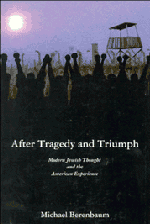Foreword
Published online by Cambridge University Press: 06 January 2010
Summary
Michael Berenbaum is a new and unique phenomenon among contemporary Jewish religious thinkers. He is an intellectual professional working for the U.S. government and a committed, religiously observant Jew. Having made his home in the capital city of the United States for more than a decade, he has an informed and sophisticated understanding of the way that very special city functions. He has worked in the White House. He is well acquainted with Congress, the city's think tanks, newspapers, lawyers, lobbyists, and religious and cultural institutions, as well as the federal bureaucracy. Unlike England, France, and Japan, the United States has two capitals: New York, the media, financial, and commercial capital; and Washington, the political capital. Both are international cities, but with very different cultures. New York has by far the larger Jewish population, actually the world's largest Jewish population, reflecting the fact that Jews have traditionally been more involved in finance, commerce, and the media world than in the world of power and command. By contrast, a goodly part of Washington's Jewish population is involved in one or another aspect of the business of government.
There is nothing accidental about Berenbaum's choice of domicile. He is a Jewish thinker with a very special academic and vocational history. He has served under President Jimmy Carter as Deputy Director of the President's Commission on the Holocaust. The Commission was charged with recommending a national Holocaust memorial. Currently, Berenbaum serves as Project Director of the United States Holocaust Memorial Museum that is being built in Washington. He also teaches at Georgetown University, an institution that itself derives much of its distinctiveness from its Washington location.
- Type
- Chapter
- Information
- After Tragedy and TriumphEssays in Modern Jewish Thought and the American Experience, pp. ix - xviPublisher: Cambridge University PressPrint publication year: 1990



